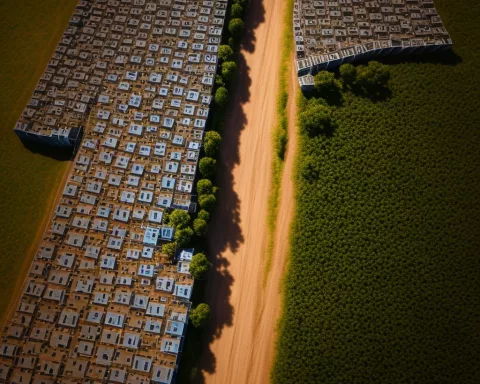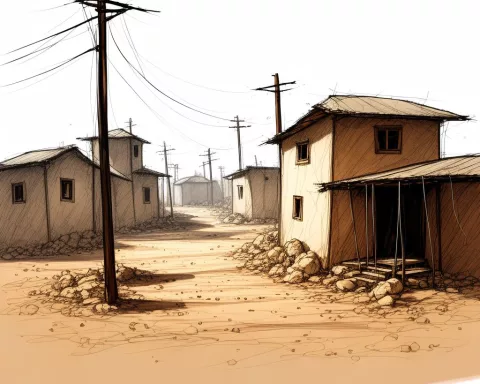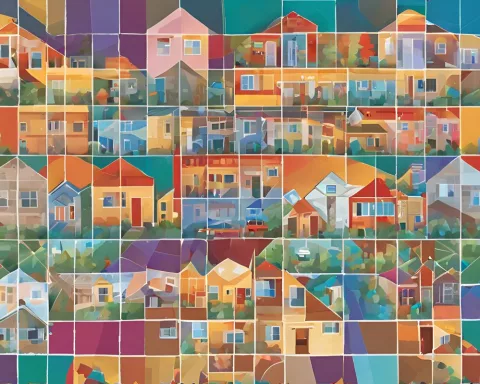The Gauteng Department of Human Settlements has taken swift action to demolish over 200 illicitly constructed shanties in an effort to curb illegal settlements. The decision came after a lengthy legal battle and the unauthorized use of essential services. The department’s Ikageleng Rapid Land Release programme provides eligible beneficiaries with fully serviced plots, complete with essential services such as water, electricity, and sewage connections. The department is determined to evict those who illegally occupy land and property and to guard against fraudulent land transactions.
What is the Gauteng Department of Human Settlements clampdown on illicit settlements?
The Gauteng Department of Human Settlements has initiated an operation to curtail illegal settlements, resulting in the demolition of over 200 unofficially constructed shanties. This decision comes after a protracted legal battle and the unauthorized use of essential services such as water, electricity, and sewage systems. The department’s Ikageleng Rapid Land Release programme assists eligible beneficiaries in acquiring fully serviced plots, complete with water, electricity, and sewage connections. The department has taken a strong stance against fraudulent land transactions and the illegal sale of government land, resolutely evicting those illegally occupying land and property.
Swift Action against Unlawful Settlements
The Gauteng Department of Human Settlements has recently initiated an audacious operation directed at curbing illicit habitation. More than 200 unofficially constructed shanties were demolished in this process. This step, reportedly leading to many inhabitants being left homeless, was implemented in the wake of a protracted legal battle. The affected community had initiated this dispute against the provincial initiative to execute their eviction.
Tahir Sema, the department’s spokesperson, communicated that the dismantling of these shanties marked the conclusion of a court proceeding that commenced in December 2022. After a lengthy period of consideration, the High Court eventually approved the eviction notice submitted by the department in January 2023.
The issue was not just the unlawfulness of these shanties; it was further complicated by the unauthorized use of essential services such as electricity, water, and sewage systems. According to Sema, these contraventions were a substantial interference to the department’s crucial Ikageleng Rapid Land Release Programme.
Ikageleng Rapid Land Release Programme and Its Objectives
The Ikageleng Rapid Land Release programme is a scheme devised to assist those who have been waiting for a long time on the department’s waiting list. The programme provides fully serviced plots, complete with water, electricity, and sewage connections, to eligible beneficiaries. The income of these beneficiaries ranges from R3,501 to R22,000, providing them the opportunity to construct their own homes.
Sema unequivocally stated that the department is resolute in evicting those who illegally possess land and property. This stance mirrors the sentiments expressed earlier this year when a stern warning was issued to the inhabitants of Sedibeng District and Tshwane. The warning pertained to the unlawful sale of government land within these communities.
Fraudulent Land Transactions and Government’s Response
It was disclosed that a sinister scheme was in operation where alleged lawbreakers would fabricate documents asserting affiliation with the Department. These documents were then exploited to deceitfully sell government-owned land to unsuspecting individuals.
Specific regions targeted by these illegal activities included the Department’s Danville project in Tshwane and the departmentally-owned land in Eagles Nest in Sedibeng. The department released a statement encouraging residents not to acquire government-owned stands in these regions or anywhere in Gauteng.
Additionally, the residents were also advised against purchasing RDP houses from unscrupulous individuals intending to swindle them out of their hard-earned money. The department clarified that its services, which encompass the allocation of RDP houses or serviced stands under the Ikageleng Rapid Land Release programme, are offered free of cost.
The Department’s Determination to Zealously Guard Its Land
The Gauteng Department of Human Settlements’ stance is unequivocal: they are committed to stamping out illegal settlements and corruption related to the allocation of land. The task is fraught with difficulties, but it is evident that they are dedicated to upholding a fair and balanced system for all deserving beneficiaries. Their vigilance and actions against unlawful settlements and fraudulent land transactions underline their commitment to maintaining the integrity of their land allocation process.
What is the Ikageleng Rapid Land Release programme?
The Ikageleng Rapid Land Release programme is a scheme established by the Gauteng Department of Human Settlements to assist eligible beneficiaries in acquiring fully serviced plots complete with water, electricity, and sewage connections. The program is designed to provide a solution to those who have been on the department’s waiting list for a long time.
What is the issue with the unauthorized use of essential services?
The unauthorized use of essential services such as water, electricity, and sewage systems by illegally constructed shanties is a substantial interference for the department’s Ikageleng Rapid Land Release Programme. It was also one of the reasons behind the decision to take swift action against over 200 illicitly constructed shanties.
What is the government’s response to fraudulent land transactions?
The Gauteng Department of Human Settlements has warned against fraudulent land transactions where alleged lawbreakers fabricate documents asserting affiliation with the department and use them to deceitfully sell government-owned land to unsuspecting individuals. The department is determined to guard against fraudulent land transactions and encourages residents not to acquire government-owned stands in specific regions.
What is the department doing to curtail illegal settlements?
The Gauteng Department of Human Settlements is taking a strong stance against illegal settlements and is resolutely evicting those who illegally occupy land and property. The department has initiated an operation to curtail illegal settlements, resulting in the demolition of over 200 unofficially constructed shanties.
What is the income range of beneficiaries eligible for the Ikageleng Rapid Land Release programme?
The income range of beneficiaries eligible for the Ikageleng Rapid Land Release programme ranges from R3,501 to R22,000, providing them with the opportunity to construct their own homes.
What is the Gauteng Department of Human Settlements’ determination regarding its land?
The Gauteng Department of Human Settlements is committed to stamping out illegal settlements and corruption related to the allocation of land. The department is dedicated to upholding a fair and balanced system for all deserving beneficiaries and is determined to zealously guard its land allocation process.












